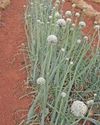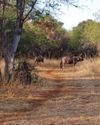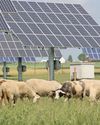
Baobabs reach extraordinarily old ages; some have been found to be thousands of years old. During their life spans, elder baobabs have survived erratic climate conditions.
As an ecologist, I have spent the past 17 years studying these trees. Over the course of 2023, I travelled across Botswana, South Africa, Namibia and Zimbabwe visiting baobabs located in the area as well as 13 other particularly large and old specimens, including Limpopo’s Sagole (named after a local hot spring), the largest baobab in the world.
As I travelled, I became increasingly impressed by baobabs’ fortitude. Not only is the cohort of Southern Africa’s oldest and largest baobabs enduring, but most baobab populations in Africa are healthy and stable, with very low mortality rates.
Indeed, nothing I saw supported the notion that Africa’s baobabs are dying as a result of climate change. This is important because baobabs have been a source of food, fibre and medicine for centuries, and over 300 uses for these trees have been identified.
In the past decade, the growing trade in baobab fruit products has supported thousands of rural communities, especially marginalised women who are able to collect fruit from the trees around their homesteads and sell it for much-needed income. The possible demise of baobabs would have devastating consequences for many people and local economies.
CLIMATE CHANGE IS NOT NEW FOR MILLENNIAL TREES
Baobabs originated in Africa, where they are found in 32 countries. It is well known that these trees reach extraordinary ages. Radiocarbon dating has repeatedly found baobabs well over 1,000 years old, with the oldest among them reaching 2,500 years.
Esta historia es de la edición 13 September 2024 de Farmer's Weekly.
Comience su prueba gratuita de Magzter GOLD de 7 días para acceder a miles de historias premium seleccionadas y a más de 9,000 revistas y periódicos.
Ya eres suscriptor ? Conectar
Esta historia es de la edición 13 September 2024 de Farmer's Weekly.
Comience su prueba gratuita de Magzter GOLD de 7 días para acceder a miles de historias premium seleccionadas y a más de 9,000 revistas y periódicos.
Ya eres suscriptor? Conectar

When short-term rentals make sense
Bianca Smit, national operations manager at CFAO Equipment SA, outlines factors to consider when choosing a rental equipment partner.

The timing of onion sowing is critical
Each onion variety has a different resistance to bolting, thus growers need experience and knowledge to guide them,

Understanding cannabis and hemp regulations in South Africa
South Africa's cannabis and hemp regulations remain a topic of debate and uncertainty, particularly when it comes to commercial use and small-scale production. Cannabis experts Shaad Vayej and Trenton Birch spoke to Octavia Avesca Spandiel about the challenges that small-scale cannabis and hemp farmers face.

European seed's influence on the US cannabis market
The expansion of European cannabis seed onto the US market is not just about economic growth; it’s also about enriching the landscape of US cannabis with diversity, innovation and education,

'It's important to get the right tool for the job'
The adoption of technology is crucial to sustaining efficiency gains and beating the cost-price squeeze in the agriculture sector.

A brilliant bushveld break between Bela-Bela and Modimolle
The distinctive touch, diligence, and 24/7 customer care are just a few of the reasons you should visit four-star Tourism Council-graded Pumula Game Farm,

John Deere: elevating performance and efficiency in modern farming
In the fast-paced world of farming, the right tools make all the difference.

The naval disaster Winston Churchill tried to hide
Three British warships were sunk by German naval gunfire on a dark day early in World War II, but the heroes who fought back received only muted recognition, possibly to avoid bad publicity,

Breaking down the principles of regenerative farming
Jean Hugo, a post-graduate student at the Tshwane University of Technology, and Leon Hugo, author on environmental matters and former professor of geography at the University of Pretoria, write about the importance of regenerative agriculture for small-scale farmers, and the challenges related to making the shift.

Ectoparasite control: more tips for livestock farmers
To reduce the mayhem that uncontrolled ectoparasites can create for communal farmers, it’s best to adopt a holistic approach in conjunction with veterinary remedies,